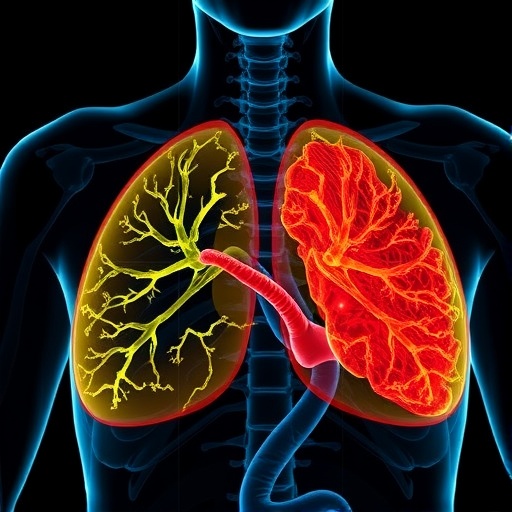In a groundbreaking study, researchers have unveiled critical insights into the genetic underpinnings of inflammatory breast cancer (IBC) specific to Tunisian patients. The innovative work utilized advanced exome sequencing techniques, allowing for an in-depth exploration of the germline landscape associated with this aggressive form of cancer. The findings, published in the journal J Transl Med, reveal significant implications for diagnosis, treatment, and understanding the hereditary aspects of IBC.
Inflammatory breast cancer, although rare, is known for its rapid onset and poor prognosis. Characterized by distinct clinical features, including noticeable changes in breast appearance, swelling, and redness, IBC often evades early detection, leading to its notorious lethality. The research conducted by Boujemaa and colleagues places a spotlight on how genomic insights can possibly transform our understanding of this disease’s biology, particularly in populations that may differ genetically and epidemiologically.
The authors emphasized the need for localized research within Tunisian cohorts, given the unique genetic diversity and environmental exposure. Through exome sequencing, the team was able to identify novel germline mutations that have not been previously implicated in IBC among other populations. These discoveries could pave the way for tailored interventions and genetic counseling for families with a history of breast cancers, thus spotlighting the importance of culturally responsive and precise medicine.
One of the most significant findings was the identification of mutations in key genes linked to cancer pathways. The altered function of these genes could help explain the aggressiveness and unique clinical presentation of IBC observed in the Tunisian population. Moreover, this research aligns with a growing body of literature that stresses the intersection of genetics and cancer epidemiology, urging for targeted research initiatives in understudied demographics.
The impact of environmental, lifestyle, and genetic factors on cancer susceptibility remains a pivotal area of investigation. Beyond hereditary predisposition, the researchers also examined the lifestyle factors that could contribute to the risks of developing IBC among Tunisian individuals. Local dietary habits, exposure to specific environmental toxins, and even reproductive history may interact with genetic susceptibilities in ways that require further exploration.
Critically, the study does not merely highlight genetic variants associated with IBC; it also calls attention to the potential for preventative strategies through genetic screening. By implementing population-wide genetic screenings, particularly for women at high risk, healthcare providers could significantly alter prognostic outcomes. The implications for public health practices and policy are profound, urging a re-evaluation of existing cancer prevention frameworks.
Furthermore, the evolutionary aspect of germline mutations unveils a fascinating narrative; these mutations may offer a glimpse into the historical context of cancer evolution in specific populations. Understanding which genetic factors are preferentially selected can illuminate the broader dynamics of cancer biology and possibly cancer’s anthropological trajectory.
The research team employed robust methodologies to ensure accuracy and reliability in their findings. Utilizing cutting-edge technologies such as Next-Generation Sequencing (NGS), they conducted comprehensive analyses, thoroughly examining the genomic data collected. The meticulous nature of their work underscores the importance of precision in genetic research, which is instrumental in yielding valid conclusions that can enhance clinical practice.
Another noteworthy aspect of the study is its potential for informing therapeutic strategies. By identifying unique genetic markers associated with IBC in Tunisian patients, oncologists could develop personalized treatment plans that are more effective than one-size-fits-all approaches. The incorporation of genetic information into treatment modalities represents a significant leap forward in cancer care, aligning with the paradigm shift towards personalized medicine.
The researchers have also positioned their findings within the context of existing literature, highlighting how their discoveries echo or diverge from earlier studies conducted in different geographic regions. Such comparative analyses can provide valuable insights into the epidemiology of breast cancer and the critical need for international collaboration in cancer research.
In conclusion, Boujemaa et al.’s research marks a significant contribution to the understanding of inflammatory breast cancer through a genetic lens. By unraveling the complex interplay of germline mutations within the Tunisian population, the study not only advocates for enhanced cancer screening and prevention strategies but also enriches the fundamental knowledge surrounding the disease. Moving forward, the hope is that such initiatives will encourage a broader scope of research, emphasizing the necessity for inclusive genetics studies that account for diverse populations.
Ultimately, this pivotal research exemplifies how a localized focus on cancer genetics contributes to the global fight against cancer. As more studies like this emerge, they will undoubtedly refine our understanding of cancer mechanisms and continue to drive advances in treatment and prevention strategies worldwide.
Subject of Research: Inflammatory Breast Cancer Genetic Insights
Article Title: Exome sequencing reveals new insights into the germline landscape of inflammatory breast cancer among Tunisian patients.
Article References:
Boujemaa, M., Hamdi, Y., Guidara, S. et al. Exome sequencing reveals new insights into the germline landscape of inflammatory breast cancer among Tunisian patients. J Transl Med 23, 1089 (2025). https://doi.org/10.1186/s12967-025-07027-8
Image Credits: AI Generated
DOI: 10.1186/s12967-025-07027-8
Keywords: Inflammatory breast cancer, exome sequencing, germline mutations, Tunisian patients, personalized medicine, cancer epidemiology, genetic screening.
Tags: advanced sequencing techniques in oncologyearly detection challenges in breast cancerexome sequencing in inflammatory breast cancergenetic mutations in Tunisian patientshereditary aspects of inflammatory breast cancerimplications for IBC diagnosis and treatmentlocalized cancer research in Tunisianovel germline mutations in cancer researchrapid onset of inflammatory breast cancertailored interventions for breast cancer patientsunderstanding cancer biology through genomicsunique genetic diversity in cancer





